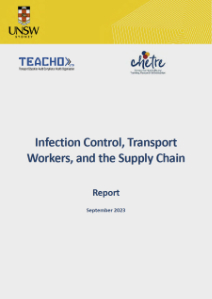TEACHO Ltd. commissioned the University of New South Wales (UNSW) Centre for Health Equity Training, Research and Evaluation (CHETRE) to undertake a multi-stage research project to investigate the risks, transmission dynamics, training solutions, and implications of pandemics for the transport industry.
TEACHO Director, Emeritus Professor Michael Quinlan labelled the research as critical to future-proofing the industry. “We can be certain that pandemics of this nature will occur again, and the recommendations from this study provide us with a road map to ensure essential goods can flow whilst there are controls in place to protect public health and our economy.”
The comprehensive research makes a number of key recommendations, which include:
- Tailor infection control activities, including pandemic prevention, to the different modes of activity across the transport sector.
- Provide ongoing education and training programs that ensure consistent and adequate adherence to infection prevention and control measures, even during non-pandemic periods.
- Engage transport sector leaders in pandemic focussed planning and decision-making, actively seek their input, fostering ownership and cultivating a sense of responsibility.
- The transport industry advocate for the development and implementation of clear and consistent infection prevention and control measures for borders throughout Australia to the federal government.
TEACHO Chair, Paul Ryan reflects, “The COVID pandemic showed us how critical supply chains are to the lives of all Australians, and also how easily these supply chains can be unnecessarily interrupted. State and Federal governments were full of praise for how the transport and logistics industry kept the country going, and we’re proud of that. But we must be better prepared next time.”
Simon Earle, TEACHO CEO states, “TEACHO Ltd. is committed to the health and safety of all transport and logistics workers, and ultimately to the sustainability of the industry. This report provides practical advice to the sector and policymakers to help us achieve those goals together.”

